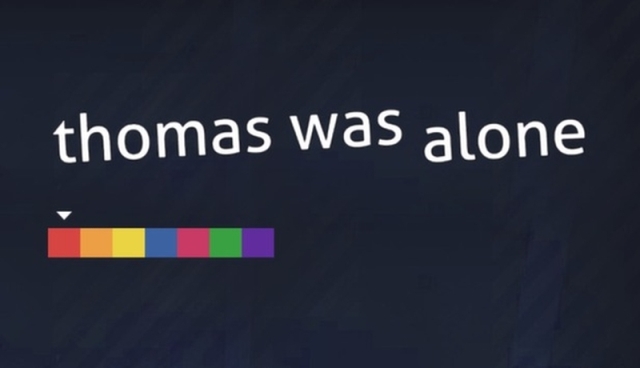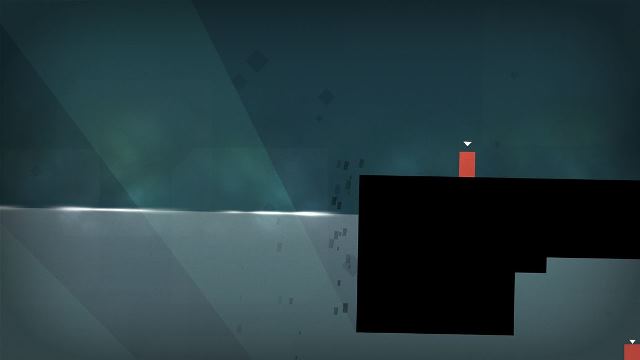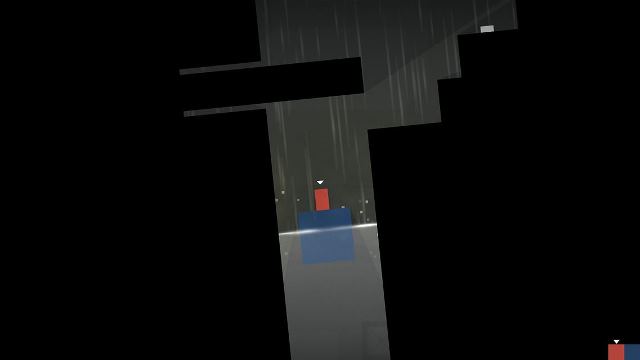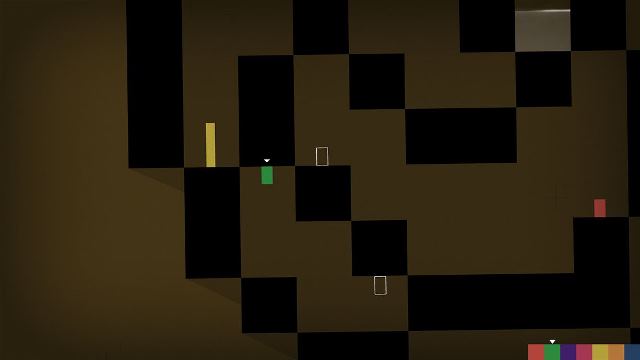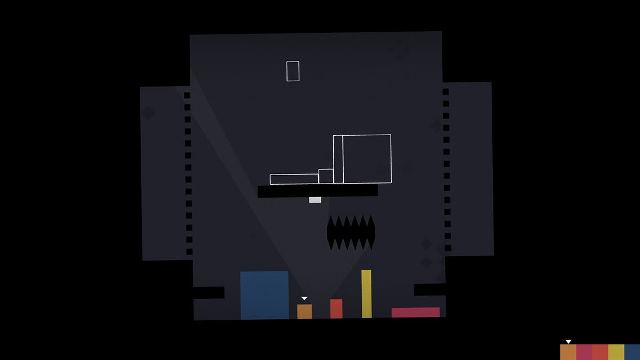Thomas Was Alone review (Xbox One)
Thomas Was Alone was developed by Mike Bithell and published on Xbox One by Curve Studios. It was released on November 21, 2014 for $10.99. A copy was provided by Curve for review purposes.
Thomas Was Alone is a game that released at precisely the right time in history. Originally debuting on PC in 2012 before finding its way to Xbox One, Thomas Was Alone perfectly captures today’s zeitgeist. Using nothing more than colored squares and rectangles that are seen and heard about but rarely heard from, developer Mike Bithell has assembled one of gaming’s most interesting and diverse casts of playable characters.
In Thomas Was Alone you play as artificial intelligences that have, as the result of a glitch in an experimental lab, become self-aware. Yes, this is a setup similar to ones we’ve seen countless times in popular media, but Bithell has breathed new life into it. AI Thomas, represented on screen by a red rectangle, is companionless and confused upon achieving self-awareness. He starts moving “up and to the right,” as the game’s delightful narrator makes a point of frequently noting, in a desperate bid to find friends and answers. It’s not long before Thomas begins encountering both, and he and his new friends endeavor to reach the awe-inspiring “fountain of wisdom” (internet connection). The staggering amount of information Thomas sees there convinces him that the AIs must work in sync towards the goal of escaping the system and entering the greater world beyond. Each AI is different in appearance and ability, and the way they learn to accept this diversity and use it to their advantage is nothing short of inspiring.
Here’s what I liked:
Growing pains — Thomas Was Alone‘s story is one of its strongest elements, and there are several reasons why that’s the case. First, the writing is top-notch; it never missteps, and it handles almost every new situation and character introduction with absolute aplomb. Compared to the other AIs, Thomas is perfectly average in size and jumping ability. He is Mario in a world populated by Luigis, Toads and Peaches. Thomas Was Alone spells Luigi as John, who was created with generous height and massive jumping ability and has no shortage of hubris as a result. He laughs inwardly at smaller characters’ pitifully short stature and leaps. Chris, meanwhile, plays the role of a grumpier Toad: he’s diminutive and can’t jump as high as the others. And while he tells himself that he has come to terms with his lot in life, his initial disdain for Thomas’ shape and skill betrays his true feelings. Each new AI encountered is noticeably unique to the point where they each could have been represented in a Mario title as different power-ups. Slowly but surely each new addition comes to the realization that his or her abilities, while indeed special, are not the be-all, end-all, and that it’s the diversity of each group member that makes them extraordinary. Observing this character growth is heartwarming.
Together, anything is possible — As you’ve likely already gleaned, Thomas Was Alone‘s character development affects gameplay as much as it does narrative. For example, pools of water are death traps for the majority of the gang, but they become laughably easy for one individual who previously thought herself useless to navigate. Thomas et al. are constantly tasked with overcoming traps and dangerous platforming challenges in order to reach end goals in each stage. Bithell takes every opportunity to poke fun of this innately gamey aspect of the proceedings through use of Thomas’ curiosity. Before later establishing goals, Thomas questions why he’s being forced to do these things, why these stages are so intentionally convoluted. Nevertheless, the journey must continue onward and upward — or rather, rightward and upward. The cooperative efforts between the group of friends make for straightforward but fun gameplay and are constant reminders of the group’s acceptance and eventual appreciation of their differences.
Sarcasm as only the Brits can do — It’s likely that were it to escape from anyone else’s lips, Thomas‘ story would be far less amusing. As it stands, the story as told by British humorist Danny Wallace is hilarious. Wallace won a BAFTA for his performance here, and he’s every bit deserving of it. The AIs never speak directly; instead, Wallace narrates the proceedings, reading their dialogue as well as conveying their inner thoughts and motivations. As easily and confidently as you might flip a switch, Wallace jumps from acerbic to sarcastic to idealistic in playing the various characters. Perhaps most impressive, though, is the way the narration and writing come together to make the player think about what precisely the AIs are saying to one another, as Wallace only hints at it rather than quoting verbatim. I could only wonder what exactly Sarah, a double-jumping purple rectangle, screamed at Thomas when he — not her — reached what she had long sought. Without the impact of Wallace’s performance, I would never have cared.
More content — If there’s one lesson gamers have been conditioned to learn, it’s that good things come to those who wait. In this case, Xbox gamers who’ve waited to play Thomas Was Alone receive good things in the form of included DLC. The Benjamin’s Flight DLC has been free to owners of the game on other consoles since it was released earlier this year, but it’s still nice experiencing Thomas as a “complete” package from the get-go rather than waiting for an expansion to arrive. It was about quarter after midnight when I finished the main quest, and I had to be up early the next morning. Nevertheless, I jumped into Benjamin’s Flight the second the credits had finished rolling — confirming that one of the few things I enjoy more than a good night’s rest is a great video game. And great it is: Benjamin’s Flight is a touching add-on that provides valuable context for Thomas’ own adventure.
Here’s what I didn’t like:
Slowly sliding sideways — There isn’t much to complain about in Thomas, but it does have one aggravation that pops up in a few of its levels. About halfway through the game you’ll be given access to a character with the most unique jumping abilities of the bunch, one that I will attempt not to spoil here. Most of the time you’ll enjoy messing around with what he brings to the table. Most of the time. Occasionally, however, it will be necessary to stack another character above or beneath him and inch the two horizontally across the screen a few millimeters at a time for what can end up feeling like forever. If it was Bithell’s aim to create some nerve-wracking experiences, he has done so — but he’s also managed to make these segments aggravating the first few times you experience them and infuriating thereafter. Given that every other platforming mechanic in the game is so excellent, these bits are disappointing but forgivable.
Wrap-up:
In the months leading up to Thomas Was Alone‘s Xbox One release, it was impossible to avoid the praise Mike Bithell had already received for his creation. That sort of thing can often lead to a work not living up to the lofty expectations your mind has built up based on the hype. Not so with Thomas’ friend-finding adventure. Thomas Was Alone is heartening in its statements about friendship and diversity — ideas reinforced throughout the game by both its narrative and gameplay. Here, the two are so closely intertwined that it’s difficult for gamers to separate where one ends and the other begins, and that’s a problem all games should aspire to have.
Score: Buy It

